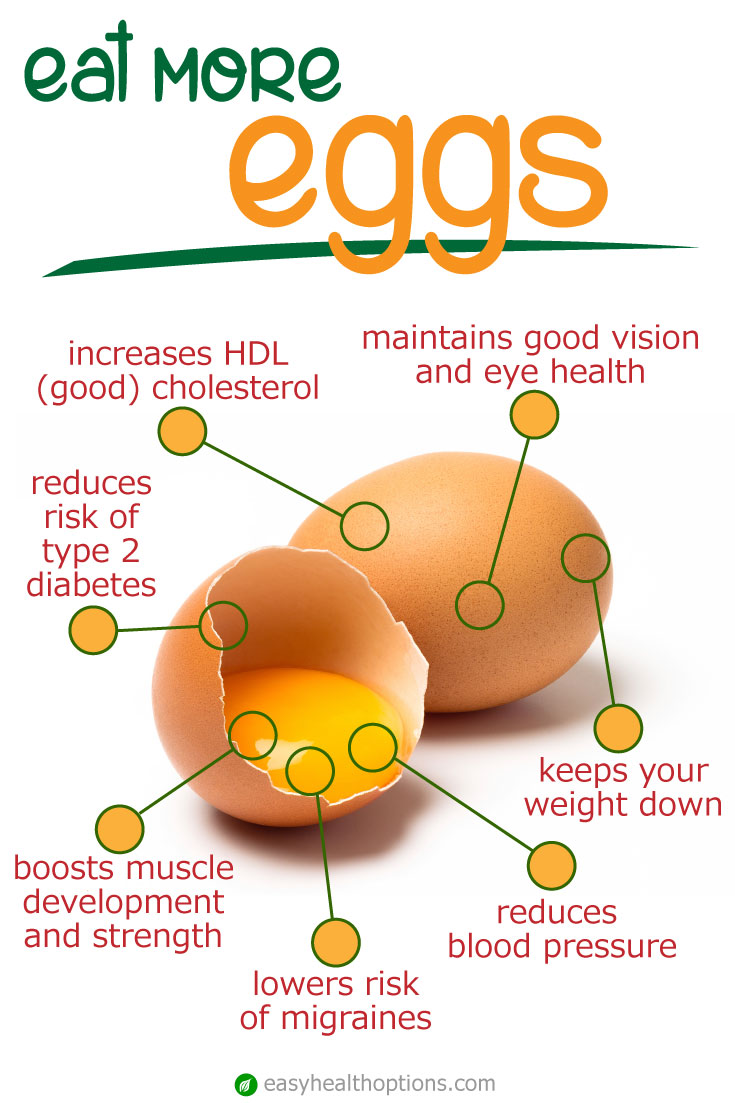Get Easy Health Digest™ in your inbox and don’t miss a thing when you subscribe today. Plus, get the free bonus report, Mother Nature’s Tips, Tricks and Remedies for Cholesterol, Blood Pressure & Blood Sugar as my way of saying welcome to the community!
3 studies that crack the ‘bad egg’ myth in a major way

In the “old days,” cholesterol was Public Enemy #1. And one of the biggest sources of cholesterol?
Eggs. Fried, scrambled … we were told over and over to lay off the eggs, for our hearts’ sake.
Then things started to shift.
The wholesale demonizing of eggs due to their cholesterol content was called into question in study after study.
Good thing for too, because eggs have too much nutritional power not to eat them!
No high-protein diet is complete without eggs. Research proves that they build muscle, and help control both weight and blood sugar.
An egg, any style, is also a potent source of iron and Vitamin D.
But just in the past few years, a flurry of studies has once again shattered the “cholesterol myth” when it comes to eggs.
Finnish studies lead the way
In 2016 and again in May of this year, a group of researchers from the University of Eastern Finland published studies in the American Journal of Clinical Nutrition demonstrating that the egg was in no way associated with greater risk for stroke or heart disease.
Both studies drew upon subjects from the Kuopio Ischemic Heart Disease Risk Factor (KIHD) Study.
Similar to the well-known Framingham Heart Study here in the U.S., the KIHD Study is a long-term effort to identify risk factors for cardiovascular disease, atherosclerosis and their outcomes (heart attack and stroke) among middle-aged men in Finland.
The 2016 study looked at whether there was any connection between cholesterol intake from eggs and carotid intima-media thickness, a measure of the thickness of the inner two layers of the carotid artery.
A CIMT test can show any thickening of this major artery before a stroke or other symptoms have occurred.
This study found that eating more eggs was not associated with a higher risk of coronary artery disease (narrow and blocked blood vessels). This was true even in people who carried a gene that made them more susceptible to this condition.
In the 2019 study, the same group of researchers investigated the possible connection between eating eggs and the risk of hypertension and stroke.
Again, regardless of any genes that made these conditions more likely, they found no association between eating eggs and stroke.
Finland does it again: Eggs prevent diabetes
Finally, early this year, three Finnish researchers, including one involved in the previously mentioned studies, took a closer look at why eggs seemed to be associated with a lower risk of type 2 diabetes.
Back in 2015, the same group had assessed over 2000 middle-aged Finnish men and found that more egg in the diet was associated with a lower risk of developing type 2 diabetes.
Now, they wanted to look at the possible chemical or biological processes in the body that were behind this.
By studying blood samples of men who ate more eggs, they found that certain lipid (fat) molecules were present in those who did not develop diabetes. And, they were able to identify compounds in the blood that were predictive of a higher risk.
One of these was the amino acid tyrosine, which produces brain chemicals that help nerve cells communicate.
More research is needed to find out just what the connection to diabetes is, but Stefania Noerman, one of the study’s investigators, says that “we now have some hints about … egg-related compounds that may have a role in type 2 diabetes development.”
The moral of the story: Eggs are OK!
“I wouldn’t say ‘eat a lot of eggs,’” said the lead author, Jyrki K. Virtanen, an adjunct professor of epidemiology at the University of Eastern Finland and one of the authors of the 2019 study on eggs and stroke risk.
“But for healthy people without heart problems or diabetes, up to one egg a day should be O.K.”
Dr. Elizabeth Klodas, cardiologist, Easy Health Options contributor and founder of Step One Foods, would agree. You can read her take on eggs, cholesterol warning, and the latest studies, here.
Sources:
- Egg consumption, cholesterol intake, and risk of incident stroke in men: the Kuopio Ischaemic Heart Disease Risk Factor Study — The American Journal of Clinical Nutrition
- Eggs Not Tied to Higher Stroke Risk — The New York Times
- Associations of egg and cholesterol intakes with carotid intima-media thickness and risk of incident coronary artery disease according to apolipoprotein E phenotype in men: the Kuopio Ischaemic Heart Disease Risk Factor Study — The American Journal of Clinical Nutrition
- Egg consumption and risk of incident type 2 diabetes in men: the Kuopio Ischaemic Heart Disease Risk Factor Study — The American Journal of Clinical Nutrition













